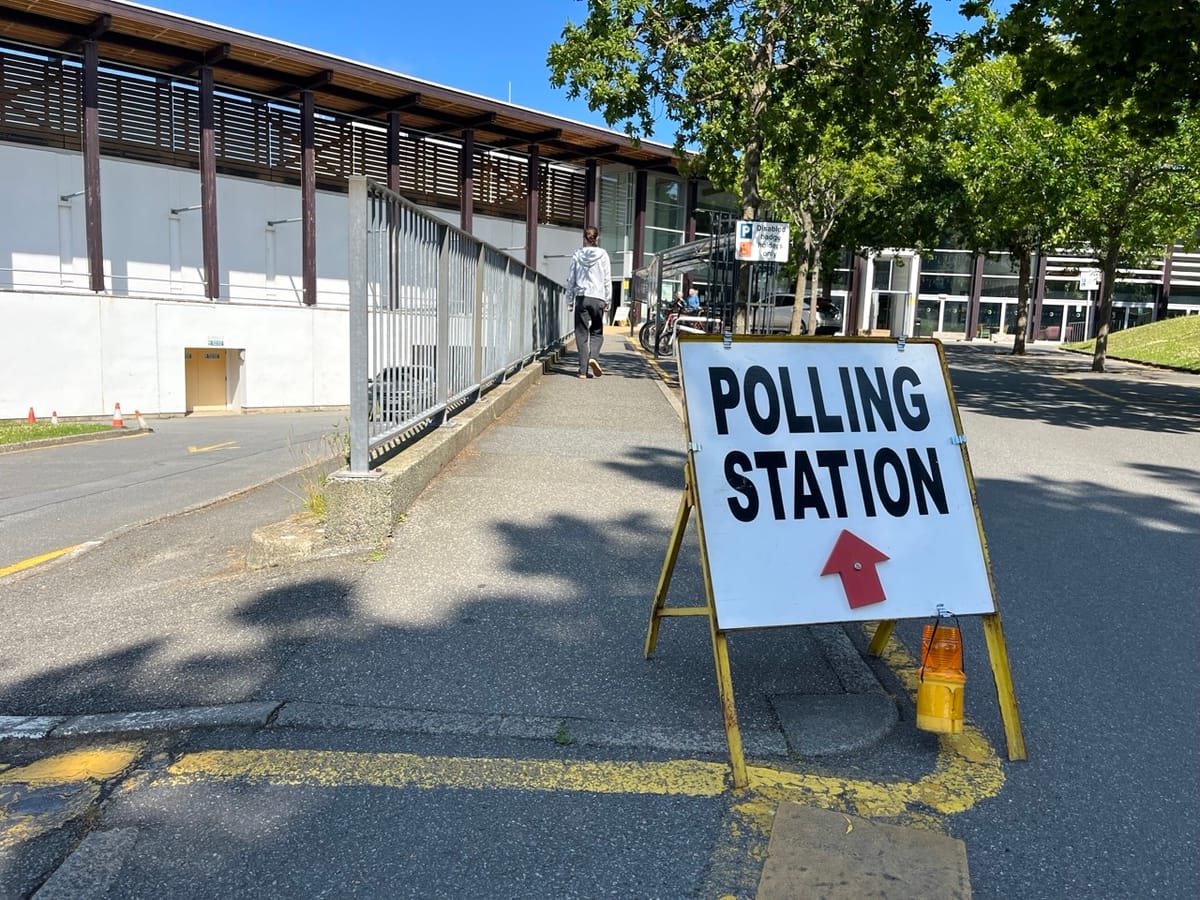Campaign law to cover candidates' conduct, party funding and media coverage among recommendations for improving general election

- An independent body has published a report on the 2025 Guernsey election.
- The report contains nine recommendations aimed at strengthening democratic processes.
- Key issues addressed include low voter registration and turnout.
- Recommendations highlight the need for a permanent electoral roll and improved campaign regulations.
- A focus on civic education and social media engagement is proposed to enhance participation.
Guernsey’s election process could be improved with a new legal framework to govern how the campaign is conducted and covered, an independent panel has said.
It would close “regulatory gaps” including rules on party organisation, campaign conduct, third-party involvement, in-kind contributions, media coverage during campaigns, and the resolution of electoral complaints and appeals.
The recommendation is made in a report written by the Commonwealth Parliamentary Association British Islands and Mediterranean Region (CPA BIMR) Election Observation Mission.
It has also said that a permanent supervisory authority should be established to ensure consistent enforcement and accountability.
Elsewhere, the mission makes recommendations to increase voter turnout and registration after only 52% of those who could signed up to vote in the June General Election, the lowest number since 2000.
Specifically it wants measures targeting young voters, with a better use of social media and promotional work in schools.
Their report also recommends a permanent electoral roll that is updated, rather than the current administrative heavy process where people have to register afresh before every General Election.
The recommendations in full
Building on the successful pilot, continue the introduction of the electronic electoral roll, ensuring it is available in all polling stations for future elections.
Extend the Convention on the Elimination of All Forms of Discrimination against Women (CEDAW) and the Convention on the Rights of Persons with Disabilities (CRPD) to Guernsey to reinforce its commitment to equality, non-discrimination, and inclusive democratic participation.
Adopt any future amendments to electoral legislation at least one year before the start of the electoral process, in line with international good practice. This will help ensure legal certainty and a level playing field for all participants.
Consider developing a comprehensive legal framework to address current regulatory gaps, including rules on party organisation, campaign conduct, third-party involvement, in-kind contributions, media coverage during campaigns, and the resolution of electoral complaints and appeals. Establish a permanent supervisory authority to ensure consistent enforcement and accountability.
Introduce a Code of Conduct for candidates. This requirement could strengthen the integrity of the campaign period, promote respectful public discourse, and reinforce candidate accountability.
Consider introducing a Code of Conduct for election campaign media coverage to clarify the roles and responsibilities for fair and balanced reporting, ensuring consistent awareness and adherence across all stakeholders.
Introduce targeted measures to foster youth participation in politics and the electoral process. This could include tailored messaging through media and social media platforms commonly used by young people, civic education programmes in secondary schools, public awareness campaigns on democratic rights and responsibilities, and dedicated support for young candidates.
Review the merits of establishing a permanent electoral roll using relevant official data sources, to increase the number of eligible voters included on the electoral roll. This roll should be updated on a continuous basis to reflect newly eligible individuals, deaths, and changes in residency status.
Establish clearer and more structured mechanisms for resolving electoral disputes, to improve transparency, ensure consistency, and strengthen public confidence in the electoral process.
“Guernsey’s legal framework for elections overall is inclusive and accessible, providing a solid legal basis for democratic participation,” the report said.
“Nonetheless, several areas remain unregulated or insufficiently codified, including rules on party organisation, campaign conduct, third-party involvement, in-kind contributions, and media coverage during campaigns.
“Moreover, there is currently no statutory framework governing the resolution of electoral complaints and appeals. While recent reforms have improved transparency and reporting obligations, enforcement remains limited due to the absence of a permanent oversight body.”
It said that some concerns were raised about abusive or misogynistic comments made online by one candidate, yet there are no clear guidelines or mechanisms to address such behaviour, unless it is raised with the police as a criminal complaint.
Guernsey does not operate a separate electoral tribunal. Instead, the Royal Court is the competent authority for handling electoral disputes.
“However, there is no clear process in the law for handling these complaints, so they are dealt with using general legal rules and judgment.”
In the absence of formal mechanisms to address electoral complaints, the Registrar-General of Electors [who leads the election team made up of civil servants] acts as the point of contact in practice for grievances and may refer complaints to the police for further investigation.
"During the 2025 election, the Registrar received a number of complaints, including reports of campaign posters being taken down or damaged, misogynistic and abusive language used by one candidate against others, and allegations of campaign overspending.
"According to information available to the Mission, none of these cases resulted in prosecution or formal action.”
Candidates are not currently required to sign a code of conduct.
“Introducing this requirement could strengthen the integrity of the campaign period, promote respectful public discourse, and reinforce candidate accountability.”
Campaign financing and coverage
Campaign spending was regulated in the six weeks leading up to the election.
Individual candidates could spend up to £3,000 and parties the same amount.
“While there was not a consensus on the matter, a number of stakeholders, including some candidates, claimed that the £3,000 limit was too low.
“They stated that it precluded them being able to print and distribute their own individual manifestos or materials to each household across the island.
"Candidates also noted it limited their ability to purchase media advertising, which was important given the island-wide system, and also served to increase their reliance on the government for their campaign.”
Parties and candidates may receive donations of money or forms of other support such as services or goods, but these have to be declared.
Donations cannot be made by people not eligible to be on the electoral roll or from legal persons based outside of Guernsey.
“Some independent candidates raised a concern that the only political party contesting the June polls [Forward Guernsey] gained an advantage from its links with and support from an associated think tank.
“It was also highlighted that there was a lack of transparency in some instances regarding who was organising some of the hustings.
"Article 45A of the Reform Law states that no money or money’s worth should be expended by a person other than a candidate with a view to promoting the election of a candidate. Transparency regarding third party support for a candidate or party is important.”
Media representatives informed the Mission that they used their own judgement on how best to cover the 82 candidates in a fair and impartial manner.
“While the BBC, for instance, has national guidelines for its coverage of an election, for other media in Guernsey there is no formal regulation or code of conduct on how to cover the process in a fair and balanced way,” the report says.
It recommended one was introduced, although it does not mention that all major organisations are already subject to general regulation from national bodies.
Strengthening voter registration and participation
Voter registration in Guernsey is voluntary and takes place separately for each election.
Anyone aged 16 or over on polling day or has been have been ordinarily resident in Guernsey for either the two years immediately before the election or for a total of five years in the past is eligible to vote.
The process for signing people up to the electoral roll begun at the start of December 2024, with forms sent to each household and an advertising campaign.
When the roll closed there were 27,316 people signed up, down around 4,000 compared to 2020.
“Having a registration process for each election with a cut-off date well in advance of the polls, rather than a rolling list of eligible electors with regular updates, is an administrative burden and risks missing some of the eligible electorate from the electoral roll.”
Youth participation remained limited in the 2025 election, the Mission said.
“Although 16- and 17-year-olds are eligible to vote in Guernsey, young people were largely absent from the electoral process, both as voters and as candidates.
“Their visibility throughout the campaign was low, turnout among young voters remained modest, and only one young candidate stood for election. This highlights a persistent gap in youth political engagement and representation.”
It recommended introducing targeted measures to foster youth participation in politics and the electoral process.
“This could include tailored messaging through media and social media platforms commonly used by young people, civic education programmes in secondary schools, public awareness campaigns on democratic rights and responsibilities, and dedicated support for young candidates.”
The report praised Guernsey’s "vibrant civil society” as playing a key role in improving diversity and inclusion in the election process.
“Overall, the 2025 election demonstrates meaningful commitment towards diversity, accessibility, and inclusion, though further alignment with international human rights standards remains a priority.”




Comments ()